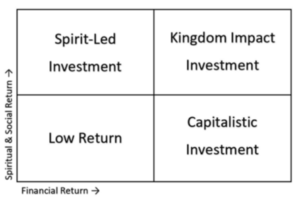Editor’s note: This content was originally published for the Christian Economic Forum’s 2019 Global Event. This content is shared with Denver Institute for Faith & Work with consent from CEF. Greg Lernihan was a speaker at "Business for the Common Good" on Friday, Jan. 31, 2020.
In God’s Perfect Timing
Everyone has life changing experiences. One of mine occurred in 2012, on a mission trip to Haiti with 31 colleagues. It was my first experience traveling to a developing country. We installed water filtration systems in rural, dirt floor shanties that housed multi-generational families. In return for clean water, each family willingly gave up valuable floor space in their small home. We learned it was an honor for them to have been selected by their pastor to receive the filtration system. They praised God for their blessing, while also praying for the work and safety of our team.
Despite my perception that all hope might be lost in such dire and impoverished conditions, I tangibly felt God’s presence throughout my trip. I returned home emotionally raw from what I had seen and experienced. Over the next 12 months, I traveled to Haiti two more times. As a result of my trips, I began to wrestle with my purpose in life and seek God’s guidance to resolve the tension I was experiencing.
During this same time period, my co-founder and I sold the majority interest of Convergint Technologies, the company we started in 2001. Despite loving my job and the enjoyment of leading the successful company we had built, I felt called to follow a different path. I was seeking ways to honor God with the business skills I had acquired and the financial gifts He had entrusted to me and my family. Influenced by Bob Buford’s book Halftime, it was my time to formally move from a life of success to a life of significance.
I left day to day responsibilities at Convergint in January of 2013. I initially thought I would use my leadership skills and capital to make a difference in the non-profit world. I quickly learned that charitable donations had only been growing at approximately 3% (inflation adjusted) each year for the last 40 years. In 2018, $410 billion was given to 1.5 million US non-profits, compared to an estimated $80 trillion of investable assets.1 This disparity of available capital, and the desire to leverage my business skills, led me to conclude that I should focus my energies on for-profit companies solving social issues.
How to Change the World
David Bornstein’s book, How to Change the World, was my introduction to the concept of social entrepreneurship and impact investing. I began scouring the Internet and reading books to educate myself on how I could get involved in this new and emerging field. The industry has defined impact investing as “investments made with the intention to generate positive, measurable social and environmental impact alongside a financial return.”2 To expedite my learning, I started making investments, mentoring impact entrepreneurs, and serving on their boards. In addition, I was also being introduced to the world of publicly traded impact investment opportunities.
It didn’t take long to form the opinion that impact investing (both private and public) wasn’t a fad, but a movement that would become a major force in the investment community. In 2013, the Global Impact Investing Network (GIIN) estimated that $25 billion of assets were held in impact investments. In GIIN’s 2018 survey, the overall industry had grown to $228 billion.3
My introduction to impact investing came from the secular world, where investors commonly reference the triple bottom line (TBL) of social, environmental, and financial returns. Impact Engine, a Chicago-based impact accelerator, became my first avenue to enter this space and get connected with like-minded individuals. To broaden my understanding of the field, I attended SOCAP (Social Capital Markets), a leading impact investing conference.
Calvert Investments claims that women and younger investors will drive the growth of impact investing.4 Women currently control 39% of investable assets in the United States. By 2020, that number is expected to rise to 50%.5 It’s also reported that the greatest transfer of wealth will begin peaking in 2031, as representatives of the Gen X and Millennial generations are set to inherit $30 trillion over the next 30–40 years.6 Additionally, nearly three-quarters of affluent Millennial and Gen X investors have already made an impact investment.7 Fueled by women and younger generations, facts suggest an impact investing tidal wave is just around the corner.
Over time, I connected with a number of Christian thought leaders in this space through Praxis, Lion’s Den, Sovereign’s Capital, Creation Investments, Graystone Consulting, Impact Foundation, The Gathering, etc. It was through these networks that I met Pete Ochs, who among other things runs a seat manufacturing company out of a Kansas State prison.8 Pete was the first person to introduce me to the concept of intentionally investing for a spiritual return. I immediately connected with Pete’s investment philosophy and now consider all of our impact investments through a faith lens. As a Christian impact investor, triple bottom line now means spiritual, social, and financial returns.
Stewarding His Resources
While we understand there is no singular answer, we struggle with the question of how best to act as faithful stewards of the resources that have been entrusted to our family. The Parable of the Talents (Matthew 25:14–20) and the Parable of the Rich Fool (Luke 12:13-–21) are challenging biblical texts for any successful businessperson. In Matthew 25, Jesus calls us to take risks and produce results, while in Luke 12, we are cautioned not to fall into the trap of accumulating more wealth and possessions. Our family lives in the tension between giving our money away and investing in enterprises that produce a high rate of return.
We currently steward our assets through granting to Christian-led ministries and investing in faith-based for-profit companies. Our Donor Advised Fund (DAF) is 100% invested in public and private impact companies and we are actively aligning our personal assets with our impact objectives as well.
To support our triple bottom line investments, we created His Fund LLC, a venture capital and debt fund. Our mission is to strategically invest in Christian entrepreneurs, seeking to generate employment opportunities for the marginalized, while also addressing the world’s greatest social concerns.

Faith Based Investment Matrix
Within His Fund, we grade each investment with a numerical score to quantify the overall impact and financial return. We evaluate all of our investments against three impact categories: Christ Centered, Social Focus, and Job Creation.
- Christ Centered: We invest in businesses that are rooted in Christian principles to advance God’s Kingdom and follow Jesus’ command to love our neighbors.
- Social Focus: We prioritize investment opportunities where social mission is at the core of the business and not just a subsequent benefit.
- Job Creation: Our focus is to create employment opportunities for the marginalized. We believe sustainable employment has the ability to combat generational poverty.
Entrepreneurs of what we call “Spirit-Led” businesses all share the same challenge—raising capital. While their businesses can be profitable, they generally lack the potential for financially attractive exits that would typically be achieved through a strategic acquisition or a private equity firm. Just because they are “Spirit-Led” doesn’t suggest they are bad investments, we have lower expectations of leadership, or the companies lack financial rigor. Instead, they are generally early stage investments trying to impact impoverished communities. Many times they are presented with unique challenges that affect their ability to scale and require affordable and patient capital to be successful.
One example of a “Spirit-Led” entrepreneur is Mel Murray and her company JOYN, LLC. To better understand poverty and marginalized society, Mel and her family moved to India to live amongst the poor. Through this move, she experienced first-hand the need to help women provide for their families. Leveraging their artisan skills, Mel founded JOYN to provide jobs by making beautifully designed handmade purses. Mel is obediently following God’s call in her life. She is equally committed to discipleship, providing jobs to the underserved and running a profitable company. With limited capital options to grow her business, we loaned JOYN capital at 4%, with favorable repayment terms. She now leads eight ventures, has created more than 400 full-time jobs in six marginalized communities across Asia, and has increased salaries by an average of 67% over the last five years.
Capitalism and Humanity
I recognize that most Christian impact investors prefer to have all of their investments in the “Kingdom Impact” quadrant, thus opportunities like JOYN’s risk profile are not attractive. In our family, we actively seek these types of opportunities. Why would we seek investments we understand have below “market-rate returns”? We have learned to trust that the Holy Spirit is leading us in this direction. We feel called as Christians to intentionally invest in opportunities that have high spiritual and social impact, but lower financial returns. God is changing our hearts through our relationships with these entrepreneurs, by supporting their impact and believing in their mission. In lieu of prioritizing our impact investment decisions on the rate of return, we are also committed to weighing the overall impact our investments can have on humanity. We believe this is God’s way of making sure we are caring for the individual/company first and the money second.
In the secular world, some impact investors are willing to accept lower market rate adjusted returns in exchange for social impact. According to the 2018 GIIN report, 36% of impact investors surveyed were open to below market rate or closer to capital reserve opportunities.9 I am hopeful that an even larger percentage of the Christian community will prioritize spiritual and social returns over their financial returns. By investing across a whole spectrum of “Spirit-Led” and “Kingdom Impact” investments, we believe we can achieve a combined financial return that is commensurate with stock market returns the last 20 years. We have many investments targeting an Internal Rate of Return (IRR) in the high teens or low twenties, but we also have investments with similar or higher risk profiles with an expected IRR in the low single digits. While our family recognizes we have benefited from the fruits of capitalism, we have discovered that we value spiritual and social impact more than we do financial returns.
For readers interested in private impact investing deals or impact funds, an excellent launching point is through a Foundation (PRI’s) or supporting organization. Working through Impact Foundation, DAF owners have the same ability to invest charitable capital directly into private deals/impact funds that support the causes and companies they are passionate about. In addition, there are a myriad of options in the public markets for investors of all sizes to participate in aligning their investments with their values.
The Journey Continues
We will never have all the answers, but we are excited to remain on the journey. We believe that deploying investable capital is the most promising option to accomplish meaningful change for the world’s most significant problems. In the book Detox Charity, Bob Lupton states “you can’t serve a community out of poverty.” My hope is that all readers will consider following the Spirit’s prompting to use their capital to advance God’s Kingdom in areas they are passionate about. I regularly encounter entrepreneurs and ministry leaders who inspire and challenge me to be a better servant leader. I am privileged to witness God’s Kingdom workers mobilize capital to address significant social issues. I am grateful for the spiritual journey that has emerged from our focus on triple bottom line investing and remain committed to stewarding God’s resources to help build His Kingdom.

